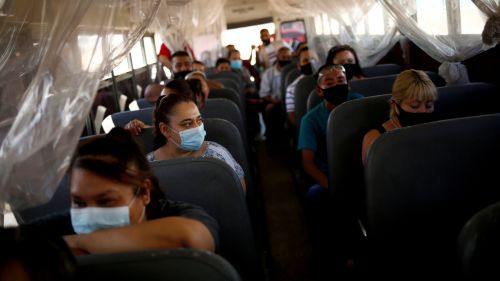Countries Have Varied Responses to Delta Variant Spread

With the global infection rate increasing for the first time since April, some countries are pumping the brakes on ambitious recovery plans.
This week the world passed the 184 million case mark, with over 3.99 million deaths attributed to COVID-19. Restrictions are beginning to ease in some countries, but many are concerned about the looming threat of the Delta variant. Vaccination rates will be crucial in determining the path of each country’s recovery from this point forward. For this week’s COVID-19 update, the Chicago Council Survey team looks at polling results from Japan, South Korea, Australia, and France.
Key Findings
- A third of the public (35%) in Japan say the Olympics should be held without fans, and another quarter (26%) support allowing a limited number of fans. In a notable shift from last month, only a minority of the public prefers to postpone (14%) or cancel (20%) the Games.
- In South Korea, according to a November-December 2020 survey conducted by the Korean Women's Development Institute, almost half (46%) of women with children up to sixth grade were fired or advised to resign.
- A majority (59%) of Australians say that their country is more united going forward than it was prior to the pandemic.
- Two-thirds (66%) in France are already vaccinated, 5 percent report they will “certainly get vaccinated”, and 10 percent report they will “probably get vaccinated”.
Japan
809,553 cases, 14,884 deaths
A TBS/JNN poll conducted July 3-4 finds that the polling, and the COVID-19 situation in Japan at large, all seems to follow a similar trend: slowly improving, but still negative in many ways. Prime Minister Suga’s support rate, for example, remains net-negative as more Japanese disapprove than approve of his Cabinet, but support is slowly rising. Evaluations of the government’s coronavirus response are in a similar place: still negative (51% disapprove, 38% approve), but slowly improving. That 13-point gap is a ten-point swing toward the positive from the last TBS/JNN poll conducted in early June, when 57 percent disapproved and 34 percent approved.
The government’s approval numbers could improve further if the virus situation doesn’t relapse, and if the government continues some of the restrictions currently in place: three-quarters of the public (76%) wants to see the restrictions currently in place in Tokyo extended past their July 11 end date. And half (50%) say that the existing measure prohibiting the sale of alcoholic beverages at restaurants after 7:00 pm is appropriate—though 21 percent say it’s too loose, and 24 percent, too strict.
The vaccine campaign is also in full swing. In the TBS/JNN poll, a third of Japanese (34%) report having received at least one shot, up nineteen points over the past month. Among the unvaccinated population, half (52%) want to get vaccinated. Only 12 percent of Japanese say they don’t want a vaccine, down six points from June. That doesn’t mean concerns over side effects are past. Half of the public (57%) are either very or somewhat worried about side effects, and only nine percent say they’re not worried at all. Still, those fears don’t seem to be standing in the way of the vaccination campaign.
Support for holding the Olympic and Paralympic Games is also on the rise. A third of the public (35%) say the games should be held without fans, and another quarter (26%) support allowing a limited number of fans. In a notable shift from last month, only a minority of the public prefers to postpone (14%) or cancel (20%) the Games. But that doesn’t mean the public has a lot of confidence in the government’s border control measures surrounding the arrival of Olympic teams to Japan: eight in ten (79%) say the existing measures are not sufficient. So far, three arriving athletes have tested positive for COVID-19, and it seems certain more cases will be detected upon entry.
The Games will open in two weeks’ time, and whether or not there will be spectators in the stands may be decided this week. As many of the competitions in the Games will, it’s coming down to the wire.
South Korea
162,753 cases , 2,033 deaths
COVID-19 cases are spiking in South Korea amid concerns over the Delta variant. On July 7 there were 1,212 new cases.
The uptick has led to a delay in easing social distancing measures. The government originally planned to loosen restrictions on July 1. But due to the resurgence—almost 80 percent of the cases coming from the capital area—current measures continued in Seoul, Gyeonggi and Incheon until Wednesday. Majorities (72%) think the one-week delay is insufficient to contain the virus according to a July 2 Realmeter survey.
As the pandemic drags on, many vulnerable groups within the population are being hard-hit. According to a November-December 2020 survey conducted by the Korean Women's Development Institute, almost half (46%) of women with children up to sixth grade were fired or advised to resign. On Saturday, around 8,000 members of the Korean Confederation of Trade Unions—a major umbrella labor union—held a street rally in Seoul to demand better working conditions. On June 24, over 40 civic organizations issued a statement that foreign residents are being left out of vaccinations due to poor access to information and services.
Public opinion polls reflect these signs of a K-shaped recovery. According to Pew Research Center's Spring 2021 survey, the share of those who think Korea is now more divided than before COVID-19 has sharply increased from 36 percent last year to 61 percent. Aware of financial difficulties among the public, the government proposed to fund another round of relief aid for those in the bottom 80 percent income bracket and small business owners. Yet the Bank of Korea voiced concerns over the mismatch between the government's expansionary fiscal policy and the bank's monetary tightening.
On the brighter side, according to a Seoul Institute survey published on July 28, consumer sentiment has risen in Seoul from 89 to 93 in the second quarter—rebounding to near pre-pandemic levels. Positive developments are also taking place in the vaccine industry. The government plans to strengthen its support for homegrown vaccine candidates and manufacture up to 1 billion doses with mRNA vaccine makers with aims to make Korea a hub for vaccine production.
Australia
30,832 cases, 910 deaths
Parts of Australia have been in hard lockdown since June 26 in an attempt to control a recent outbreak of the Delta variant. For Sydney, this outbreak is the largest in 2021 so far after beginning three weeks ago when a limousine driver transported an overseas airline crew through the city. Officials in New South Whales decided on Tuesday to extend Sydney’s lockdown another week, rather than ending it on Friday as was originally planned, due to new infections in the community.
Australians are no strangers to lockdowns—the country’s lockdown protocol is credited as one of the main reasons the country has had so few COVID-19 infections and deaths compared to other developed countries. For the most part, Australians support these restrictive measures. The March 15-29 Lowy Institute Poll finds that 95 percent of Australians think their country has responded well to the pandemic. Similarly, a Spring 2021 Pew Research Center poll finds that 68 percent of Australians say the right amount of restriction was placed on public activity throughout the pandemic. This level of satisfaction with governmental response is exceptional given that only 17 percent of Americans and an average of 40 percent of Europeans feel that their governments have struck the right balance when it comes to COVID-19 restrictions.
Optimism among Australians seems to continue when looking to the future. In the same Pew poll, three quarters (75%) of Australians say that their economy is recovering from the pandemic in a way that shows the strength of their economic system, and 86 percent feel confident in their healthcare system to handle a future public health emergency. A majority (59%) feel that their country is more united going forward than it was prior to the pandemic.
One metric in which Australia is still lagging behind many other developed countries is in vaccination rate. Only 7.4 percent of Australians are vaccinated, and the rate of increase in vaccine administration actually slowed throughout June. Some experts have explained this low rate by saying that Australia relied too heavily on two vaccines: AstraZeneca, and one produced by the University of Queensland that failed in early trials. Vaccine hesitancy also plays a role, with a poll conducted by The Sydney Morning Herald, The Age, and Resolve Strategic finding that 29 percent of Australian adults are unlikely to get the vaccine. Hesitant respondents cited fears about side effects, a lack of information about vaccines, and a desire to see others get the vaccine first, among other factors, when asked to explain their reluctance. Australia is currently in the first of four stages of its recently-announced plan for a return to post-pandemic normalcy; the rate of vaccination from this point forward will be the most important factor in determining how quickly Australia is able to progress through the phases of that plan.
France
5,677,746 cases, 110,290 deaths;
On May 11, France began to emerge from its third country-wide lockdown. Although citizens were allowed to leave their homes, the country imposed a strict curfew and forced restaurants, cafes, hotels, and cinemas to remain closed. As the country’s COVID-19 cases steadily declined, French President Emmanuel Macron chose to end the lockdown on June 20, effectively removing the curfew and allowing the country to re-open entirely.
As citizens continue to return to their lives, they remain focused on promoting mass vaccination efforts in hopes of preventing a fourth lockdown. Survey analyst Véronique Reille-Soult, CEO of Backbone consulting, notes that there has been a massive push across social media for continued vaccination. Internet users are supportive of the vaccine and continue to encourage those who are reluctant to get vaccinated in hopes of preventing a fourth wave of the pandemic in France.
Presently, 66 percent of French citizens are already vaccinated, 5 percent report they will “certainly get vaccinated," and 10 percent report they will “probably get vaccinated." According to official reports, 60 percent of citizens aged 18-75 are already vaccinated, while nearly 90 percent of citizens over 75 are vaccinated. Two in ten (19%) of the population remains resistant to vaccination: with 8 percent reporting they will “probably not get vaccinated”, and 11 percent reporting they will “certainly not get vaccinated."
Public opinion of the country’s vaccination plan continues to improve as well. The government’s vaccination efforts are now judged “effective” by 60% of French people, a significant recent improvement; just two months ago, only 32% if the population judged the government's efforts to be effective. This substantial shift in public opinion will likely have positive implications for Macron’s campaign and may help him secure a victory in the fall elections.





